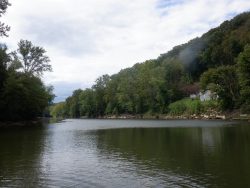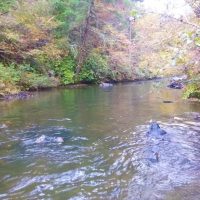 (Kanawha County, WV) The United States Army Corps of Engineers (USACE) proposed streambank protection measures along 1,520 linear feet of the right-descending bank of the Elk River in Kanawha County, WV. Streambank erosion and potential loss of wastewater infrastructure had been observed at two separate reaches of the Elk River. The goal of the project was to prevent loss of the wastewater line and lift station and maintain services for residents within the Elk Valley Public Service District. Because of the proposed instream work associated with the project, the West Virginia Division of Natural Resources (WVDNR) and the United States Fish and Wildlife Service (USFWS) required a mussel survey.
(Kanawha County, WV) The United States Army Corps of Engineers (USACE) proposed streambank protection measures along 1,520 linear feet of the right-descending bank of the Elk River in Kanawha County, WV. Streambank erosion and potential loss of wastewater infrastructure had been observed at two separate reaches of the Elk River. The goal of the project was to prevent loss of the wastewater line and lift station and maintain services for residents within the Elk Valley Public Service District. Because of the proposed instream work associated with the project, the West Virginia Division of Natural Resources (WVDNR) and the United States Fish and Wildlife Service (USFWS) required a mussel survey.
The Phase 1 and Phase 2 mussel surveys were completed by a federally permitted malacologist and our commercial dive team. During these surveys, 720 live mussels of 15 species were collected within the project survey areas, including two live federally endangered snuffbox (Epioblasma triquetra) and two “proposed threatened” (as of January 2022) round hickorynut (Obovaria subrotunda) mussels. The location for each individual was logged in the field using a sub-meter accurate GPS, and coordinates were immediately provided to the WVDNR and USFWS.
After completing the mussel surveys, EnviroScience and USACE initiated formal consultation with USFWS to further facilitate project completion.
EnviroScience maintains a hearty staff of malacologists who are all permitted to conduct freshwater mussel surveys. Our experience includes endangered mussel surveys, impact assessments, translocations, mitigation design, biological assessments, expert consultation, and experimental lab and field research on mussels. Further, EnviroScience is one of the few biological firms in the country that is a general member of the Association of Diving Contractors International (ADCI) and offers full-service commercial diving services. Our diving meets the highest standards for safety and efficiency, including those of the U.S. Army Corps of Engineers (USACE) EM385-1-1, the Occupational Safety and Health Administration (OSHA), ADCI, and the U.S. Coast Guard.

